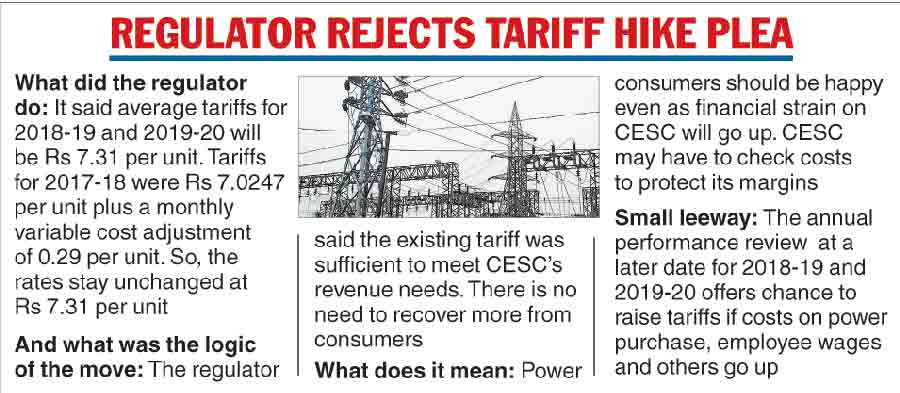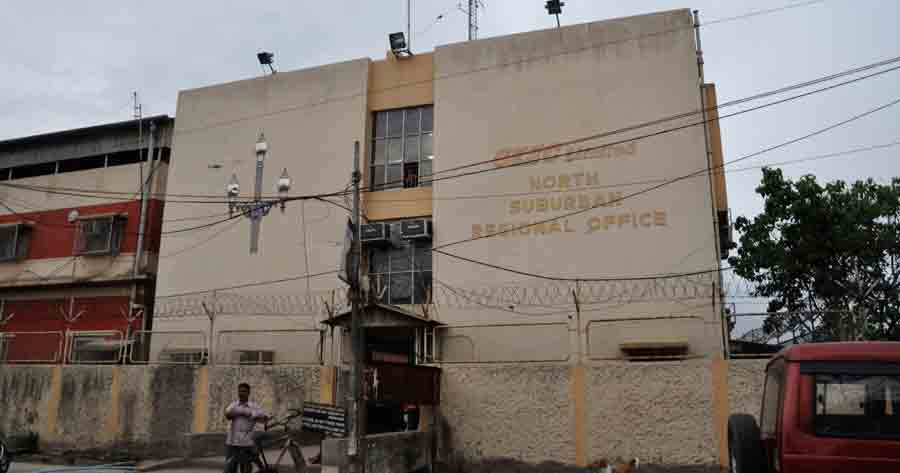The 3.2 million electricity consumers in and around Calcutta have been spared a ‘shock’ – at least for now. The state power regulator has turned down a plea made by power utility CESC to raise electricity tariffs.
The West Bengal Electricity Regulatory Commission has worked out an average tariff of Rs 7.31 per unit for CESC in 2018-19 and 2019-20 after subsuming a monthly variable cost adjustment (MVCA), effectively leaving the overall tariff the same.
For 2017-18, CESC’s average tariff was Rs 7.0247 per unit plus an additional MVCA of 0.29 per unit.
The average tariff worked out by the WBERC, however, is significantly lower than the rates proposed by CESC at Rs 8.32 per unit and Rs 8.51 per unit in 2018-19 and 2019-20, respectively.

CESC had claimed in its submission to the WBERC that there has been a sharp increase in fuel prices and urged the regulator to consider an upward revision in tariff.
“The financial years of 2018-19 and 2019-20 have been completed. The existing tariff, including the MVCA at the existing rate is sufficient to recover the ARR (aggregate revenue requirement) for both the years 2018-19 and 2019-20. Thus, there is no requirement for additional recovery or refund from/to the consumers during the years 2018-19 and 2019-20 through tariff at present,” said the WBERC in its tariff order.
The regulator, however, has said that any variation in actual recovery could be adjusted at the Annual Performance Review (APR) for the two years at a later date.
Power purchase costs, employee costs (which are linked to the rate of inflation), interest on working capital and taxes are some of the charges that can be adjusted during the APR.
The tariff order for the West Bengal State Electricity Distribution Corporation, which serves the majority of the state population including Salt Lake and Rajarhat, came out in August, 2021 and there was no change in effective tariff, too.
The regulator’s decision on CESC’s petition suggests that the ruling dispensation is unwilling to take any hard decision that may not go down well with the electorate.
The flip side of this strategy is that will put a strain on the fiscal health of the power distributors – both private and state-owned.
The distribution companies have also filed petitions relating to a three-year period starting 2020-21 and these are now under the consideration of the regulator.
With an energy sale of 10.08 billion units in 2018-19 and 10.44 billion in 2019-20, the WBERC order calculates total revenue recoverable through tariff at Rs 7,379.80 crore in 2018-19 and Rs 7,636.51 crore in 2019-20 after adjusting for revenue earned from the sale of power to WBSEDCL and the amount recoverable through APR of 2013-14.
According to sources, the regulator’s decision to subsume MVCA in tariff can be compared to a zero-base budgeting exercise which now puts the onus on CESC to justify its expenses going forward starting on a zero base as opposed to incremental increases over previous estimates.
Cost rationalisation
A lower-than-expected increase in tariff could mean that CESC might have to rationalise costs in order to protect its margins.
“The regulator has maintained the tariff at the same level as FY18, subsuming MVCA components, and has deferred recovery of around Rs 3 billion (300 crore) per annum for the order years, asking CESC to file and recover the same in the APR/true up. While the WBERC has allowed CESC to compute the MVCA later and realise/refund accordingly, we are yet to receive clarity on the timing of recovery by the company,” said ICICI Securities in its research note.
The company declined to comment on the tariff order published by the regulator.
“One thing is clear from the order that the regulator is not comfortable to increase the tariff from the current levels. Hence to maintain recovery, of all incurred costs of the past in the future, CESC will have to make serious efforts to rationalise costs to create more fiscal space,” the brokerage added.
One of the major cost heads which can be rationalised is the employee cost which is a controllable expense, since on a base of around 9000 employees, 400 retire annually,” the brokerage added.











